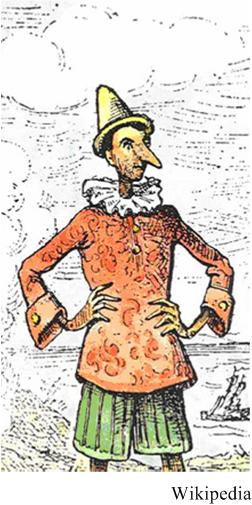 This problem in logic from Presh Talwalkar recalled an article I wrote a while ago but did not publish. So I thought I would post it as part of the solution.
This problem in logic from Presh Talwalkar recalled an article I wrote a while ago but did not publish. So I thought I would post it as part of the solution.
“Assume that both of the following sentences are true:
- Pinocchio always lies;
- Pinocchio says, “All my hats are green.”
We can conclude from these two sentences that:
- (A) Pinocchio has at least one hat.
- (B) Pinocchio has only one green hat.
- (C) Pinocchio has no hats.
- (D) Pinocchio has at least one green hat.
- (E) Pinocchio has no green hats.”
Actually, the question is which, none or more, of statements (A) – (E) follow from the two sentences?
See Pinocchio’s Hats for solutions.
